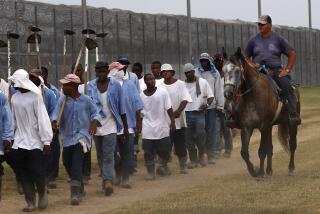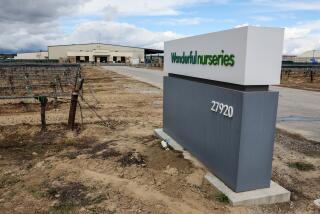Black Farmers Protest USDA Practices
WASHINGTON — Several hundred black farmers called for an end Wednesday to U.S. Agriculture Department practices they say are discriminatory and threaten the existence of black farms.
At a rally outside the USDA and at a special hearing of the Congressional Black Caucus, speakers had the same message: The USDA must erase immediately the practices that have caused it to be labeled “the last plantation.”
John W. Boyd Jr., president of the National Black Farmers Assn., which sponsored the USDA rally, said black farmers are losing land at a rate of 9,000 acres a week.
“We can no longer afford to remain silent,” he told the morning rally. “We must demand an end to discriminatory practices at USDA that are driving us off our land.”
Indeed, Rep. Maxine Waters (D-Los Angeles), who chairs the Black Caucus, told farmers packed into a hearing room in the afternoon that if current trends continue, black farms will vanish by 2000.
“Discrimination and lack of access to capital are the key reasons for the decline of the African American farm,” she said. “We believe that part of the problem at the USDA is institutional. Bureaucrats at all levels have actively worked to deny access to loans.”
Agriculture Secretary Dan Glickman and a dozen top aides listened to farmer after farmer recite examples of allegedly discriminatory treatment they had received from personnel at the department’s local field offices.
Boyd, for instance, recalled an instance in which it took 222 days for the USDA to process an African American farmer’s loan application, while it took just 60 days to approve a loan for a white farmer.
Glickman acknowledged that the “biggest challenge we face at USDA--the one that’s consumed the most of my time and commitment--has been civil rights.”
Saying the problem is decades old, he repeated a promise “that on my watch, we’ll change the culture of the Department of Agriculture. . . . We will close down ‘the last plantation’ and reopen the door to ‘the people’s department.’ ”
Glickman said a new civil rights division he created “is in high gear, working to eliminate the backlog of program discrimination and equal employment opportunity complaints.”
More to Read
Sign up for Essential California
The most important California stories and recommendations in your inbox every morning.
You may occasionally receive promotional content from the Los Angeles Times.










